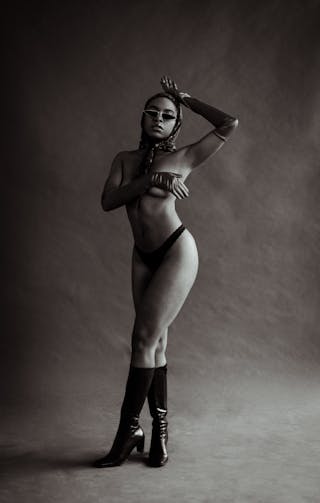The topic of dating and sexual orientation can be a sensitive one, especially when it comes to bisexuality. Many people have preconceived notions about what it means to date a bisexual person, and these notions can often be based on stereotypes and misunderstandings. In this article, we will explore the question: does not wanting to date a bisexual man make you a bad person?
So, you've met someone you really like, and they just happen to be a little different from what you're used to. Maybe they're into things you haven't tried before, or maybe they have experiences that you've never considered. But isn't that what makes dating exciting? Being open-minded and willing to learn more about someone can lead to new adventures and deeper connections. Who knows, you might just find yourself enjoying something you never thought you would! So why not give it a try and see where it takes you? For more tips on navigating the dating world, check out this article on sexting.
Understanding Bisexuality
If you're interested in exploring pegging hookup sites, check out this site and see if it's right for you.
Before we can delve into the question at hand, it's important to have a clear understanding of what bisexuality is. Bisexuality refers to the romantic or sexual attraction to both men and women. This means that a bisexual person is capable of forming meaningful relationships with individuals of both genders.
Check out Hookups Near Me and see how easy it is to find local connections in your area.
It's crucial to note that bisexuality is a legitimate sexual orientation, and it is not a phase or a transitional state. Bisexual individuals are just as capable of forming committed, loving relationships as anyone else, regardless of the gender of their partner.
Explore new possibilities for adult dating and fun
The Stigma Surrounding Bisexuality
Unfortunately, bisexuality is often stigmatized in society. Bisexual individuals may face discrimination and prejudice from both the heterosexual and LGBTQ+ communities. They may be labeled as confused, promiscuous, or untrustworthy, simply because of their sexual orientation.
This stigma can also manifest in the dating world. Some people may be hesitant to date a bisexual person because they believe in these stereotypes. They may worry that a bisexual partner will be more likely to cheat, or that they won't be able to fully satisfy their partner's needs. These fears are based on misconceptions and do not reflect the reality of bisexual relationships.
Exploring Personal Preferences
When it comes to dating, it's important to recognize that everyone has their own preferences and boundaries. Some people may feel uncomfortable dating someone of a particular sexual orientation, and that is entirely valid. It's crucial to respect and honor these personal preferences, as long as they are not rooted in discrimination or prejudice.
For example, if someone feels uncomfortable dating a bisexual man because they have insecurities about their partner's past relationships, it's important to address these insecurities and communicate openly with their partner. On the other hand, if someone refuses to date a bisexual man simply because of their sexual orientation, without any valid reason, this can be seen as discriminatory behavior.
Challenging Biases and Stereotypes
It's important to challenge the biases and stereotypes that may influence our dating preferences. By educating ourselves and engaging in open, honest conversations with bisexual individuals, we can gain a deeper understanding of their experiences and perspectives.
If someone finds themselves hesitant to date a bisexual man, it may be beneficial to examine the root of this hesitation. Are these feelings based on genuine concerns, or are they influenced by societal prejudices? By addressing these biases, individuals can make more informed and empathetic decisions when it comes to dating.
Conclusion
In conclusion, the question of whether not wanting to date a bisexual man makes you a bad person is a complex one. It's essential to recognize and respect individual preferences while also challenging biases and stereotypes that may influence these preferences. By engaging in open, honest conversations and educating ourselves about bisexuality, we can create a more inclusive and understanding dating landscape for all individuals, regardless of their sexual orientation.
- https://online-dating.thehottieandthenottie.com/posts/does-your-dating-app-want-you-to-stay-single/
- https://best-casual-dating-platforms.patternismovement.com/posts/bisexual-dating-show-with-courtney-act-the-bi-life/
- https://best-casual-dating-apps.patternismovement.com/posts/16-amazing-inclusive-sex-toys-to-try-now/
- https://online-local-dating-platforms.jershaanddup.com/posts/sexual-fantasies-for-women-and-men-to-act-out-irl/
- https://online-local-dating-platform.datingapps.shop/posts/what-is-an-orgy-really-like/
- https://top-local-encounters-site.prettygirlsmakegraves.com/posts/polyamory-diaries-12-can-a-marriage-survive-without-sex/
- https://online-meetup-site.prettygirlsmakegraves.com/posts/my-best-sex-ever-was-with-a-bollywood-star/
- https://online-meetup-platforms.patternismovement.com/posts/body-safe-sex-toys-10-of-the-best-bodysafe-sex-toys/
- https://local-dating-platforms.cactusclubsj.com/posts/lets-talk-about-sex/
- https://free-meetup-platforms.wsmchicago.com/posts/antiracist-dating-how-to-be-anti-racist-on-dates/
- https://free-hookup-app.patternismovement.com/posts/my-best-sex-ever-was-in-a-threeway/
- https://free-casual-dating-websites.niklasbelenius.com/posts/why-you-should-embrace-your-delulu-dating-goals/
- https://best-discreet-hookup-website.warriorkingsbattles.com/posts/my-best-sex-ever-was-on-paypal/
- https://online-hookup-site.patternismovement.com/posts/apparently-straight-people-still-think-bisexual-women-are-confused-and-promiscuous/
